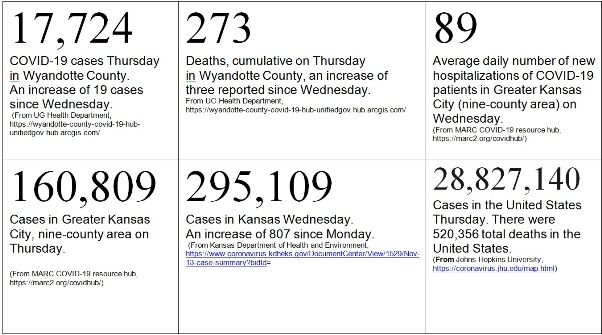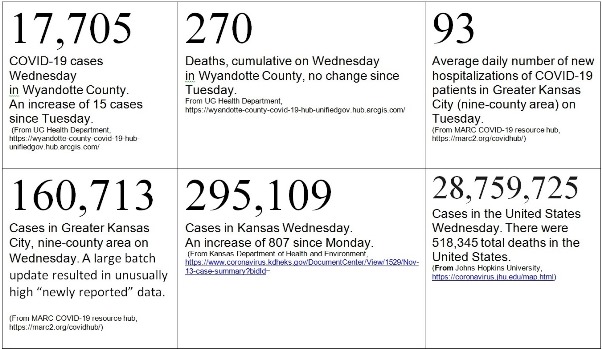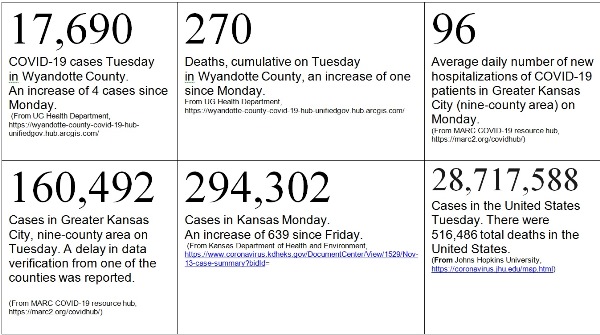
All meatpacking plant workers in Kansas will be prioritized for COVID-19 vaccines, Gov. Laura Kelly announced Thursday.
The workers will receive their vaccinations within the next two weeks, according to the governor.Some received their vaccinations on Thursday.
Counties with meatpacking plants will receive vaccine doses for the workers in addition to the regular doses they receive, according to the governor.
“Throughout this pandemic, meatpacking plant workers have stepped up to successfully maintain the food supply chain,” Gov. Kelly said. “We owe them our gratitude for keeping food on the shelves and on the plates of families across our state, our nation, and the world.”
The governor also mentioned that many meatpacking plant workers in Kansas were Hispanic, and were disproportionately affected by the COVID-19 virus.
There were an estimated 12,000 workers in the meatpacking industry in Kansas, Gov. Kelly said.
“Since the pandemic began, many of us have anxiously awaited this day…a day where our meat processing employees would have access to a vaccine that would protect them, their coworkers, and their families,” Kansas Agriculture Secretary Mike Beam said.
Beam said the larger meatpacking plants in Kansas are in Seward, Ford, Finney and Cowley counties. There are also a half-dozen or so counties that have smaller and mid-sized meatpacking plants on the list, he said.
Wyandotte County has had some small meatpacking plants on the Unified Government Health Department’s outbreak map during the past year.
The governor said at a virtual news conference Thursday that the state was generally following the national CDC vaccination guidelines when it placed health care workers at the top of the list for vaccines. Phase 2, the current phase in Kansas, includes high-contact critical workers, as well as those over age 65.
According to the governor, the Kansas Department of Health and Environment will be directly coordinating the meatpacking plant vaccinations. Some vaccinations will be on site at the plants.
Enrique Rodriguez Franz, a radio station general manager in southwest Kansas, said vaccinations had already started at one meatpacking plant on Thursday afternoon in Liberal, Kansas.
The vaccination effort for meatpacking plant workers was supported by a Kansas local farm workers’ union.
Vaccine distribution an ethical issue
Who gets the vaccine, and who gets it first before others, is an ethics issue, not just a logistics issue, according to doctors at the University of Kansas Health System’s news conference on Thursday.
Dr. Terry Rosell, director, Ethics Consultation Service and professor of history and philosophy of medicine at the University of Kansas Medical Center, said there have been feelings of frustration and confusion about the vaccines. There have been disparities in vaccine distribution, although a big part of the problem has been scarcity of the vaccine, he said. As it becomes more available, they will probably see more mass vaccinations, he said.
While there have been systemic issues, at the same time there are leaders who are doing the best they can under really difficult circumstances, he said.
“Let’s think about the ‘we’ and not only the ‘me,’” Dr. Rosell said. “It’s about ‘us,’ it’s not just about ‘me’ and ‘mine.’” He urged people to be patient.
Dr. Rosell also said that when he urged people to be patient, he was talking about people like himself. There are others in society who have been patient way too long, he said, and these include the most vulnerable populations.
John Carney, president and CEO at the Center for Practical Bioethics, said there is an obligation for everyone to make sure the vulnerable are cared for and prioritized. Those who are homeless, in prison, older, and in nursing homes, have not been served well in the pandemic, he said. Some of the front-line essential workers also did not receive the support they needed in the pandemic, he added.
Currently, there is an effort to reach out to the most vulnerable, he said.
Dr. Rosell said the Center for Practical Bioethics looks at the equitable distribution of scarce resources.
“This is a classic example of scarcity,” he said.
Allocations then are made on the basis of essential workers, those who are most vulnerable and those who have historically and systemically experienced racism and inadequate access to health care and have experienced higher infection, higher morbidity and higher mortality rates, Dr. Rosell said.
With electronic signups for the vaccines, there is an automatic selection for people who have access to the technology, Dr. Steve Stites, chief medical officer at KU Health System, said. Several of those providing vaccines now have alternate systems of telephones to try to reach more of the vulnerable population.
Dr. Dana Hawkinson, medical director of infection prevention and control at KU Health System, noted that they have never seen a demand this high for the flu vaccine or for a tetanus vaccine. Underlying there are inequalities, and those are coupled with a less than optimal infrastructure in getting the vaccine to the vulnerable populations.
Dr. Hawkinson said Wyandotte County has done a good job of reaching out to vulnerable populations in the vaccine effort, and also in testing. The KU Health System has reached out by phone and mail to try to get the most vulnerable populations vaccinated, also, he said.
Dr. Stites said to vaccinate 330 million people, there needs to be a national plan. Information conveyed at every level has been scarce, he said, and has made decisions about how to vaccinate people much harder, as they don’t know how much vaccine they will get.
Another ethical issue in the future could be whether people have to show a vaccine card to travel or attend an event, according to Dr. Rosell. In some cases, such as traveling to another country, proof of vaccination is already required and shows a person is safer than if the person had not been vaccinated. However, vaccine access has been more difficult for people who don’t have resources, and if people are required to show a card stating they had the vaccination, it may erode a sense of solidarity. Such a move could exacerbate the disparities that already exist between the haves and have-nots in society, he said.
Ultimately, the vaccine card as a travel card internationally probably needs to be done, he said.
“What I would argue for is patience,” he said. Maybe they shouldn’t do it now, but ultimately a vaccine card could be necessary to go to other parts of the world, he said.
Wyandotte County’s vaccination priorities
Not everyone sees differences in vaccine distribution in Wyandotte County as between economic or racial groups. Some see it as a difference between public employees who received vaccines early and residents who are not public workers. Wyandotte County’s COVID-19 vaccination priorities came up very briefly during the Unified Government Commission’s four-hour virtual budget strategic planning meeting on Thursday night, March 4.
The earliest vaccinations in Wyandotte County, as many other places, went to health care workers, high-contact critical workers and school employees. The UG Health Department has opened vaccinations to those older than 65 with appointments, but priority was given to those who live in Zip Codes 66101, 66102 and 66105, in the eastern part of Wyandotte County. Since then the Health Department also has prioritized residents over age 85 from any part of Wyandotte County, who can walk in without appointments to get a vaccine.
The Health Department’s vaccine map on its vaccine page showed the highest number of vaccinations so far have been in the 66109 Zip Code area in the northwestern part of Wyandotte County. It is one of the wealthier areas of the county.
When talking about budget priorities at the March 4 UG meeting, UG Commissioner Mike Kane, who represents the 5th District including part of Zip Code 66109, said one of his short-term priorities was “shots for all of Wyandotte County.”
“I know that we’re doing it by Zip Code,” he said. When he asked about it, he was told 66109 had more vaccinations than anywhere else in the county, he said.
The 66109 Zip Code has many public safety employees, teachers, sheriff’s officers, and police living there, Commissioner Kane said. He added that the UG should advocate to get as many vaccine doses as possible and share them with everybody. Right now, that’s the most important thing to him, he added.
COVID-19 case numbers reported
The total number of COVID-19 active and recovering COVID-19 patients at the University of Kansas Health System was 44 on Thursday, a decrease of two from Wednesday, according to Dr. Hawkinson, medical director of infection prevention and control. There were 14 active COVID-19 patients in the hospital, a decrease of one since Wednesday. Three of those patients were in the intensive care unit, a decrease of two from Wednesday. One of those was on a ventilator. There were another 30 patients hospitalized because of COVID-19 who were out of the acute phase, a decrease of one since Wednesday.
Wyandotte County reported an increase of 19 COVID-19 case on Thursday, March 4, for a cumulative 17,724 cases. There was a cumulative total of 273 deaths reported, an increase of three since Wednesday.
The Mid-America Regional Council’s COVID-19 dashboard reported 160,809 cumulative COVID-19 cases on Thursday. The daily average of new hospitalizations was 89. Cumulative deaths in the nine-county area were 2,236.
The state of Kansas reported 295,109 cumulative COVID-19 cases on Wednesday, March 3, an increase of 807 cases since Monday. There were a total cumulative 4,816 deaths, an increase of 73 deaths since Monday, according to KDHE figures.
The Johns Hopkins University COVID-19 dashboard on Thursday night reported 28,827,140 cases in the United States, with 520,356 total deaths nationwide.
COVID-19 tests scheduled Friday
Free COVID-19 testing is available from 8 a.m. to noon Friday, March 5, at the Beatrice Lee Community Center, 1310 N .10th St., Kansas City, Kansas. No appointment is necessary for this test. Tests are available regardless of symptoms or exposure to COVID-19. The tests are in conjunction with the Wyandotte County Health Equity Task Force. To see if there is any change to the schedule, visit https://www.facebook.com/UGHealthDept.
The Pierson Community Center COVID-19 testing site at 831 S. 55th is open from 9 a.m. to 5:30 p.m. Friday, March 5. Tests are through WellHealth. Appointments are required, check with the website, www.gogettested.com/Kansas, for available appointment times.
Another COVID-19 testing site will be at Lowe’s, 6920 State Ave., Kansas City, Kansas, starting at 8 a.m. Tests are through WellHealth. Appointments are required, check with the website, www.gogettested.com/Kansas, for available appointment times.
Unified Government COVID-19 testing and vaccine sites are scheduled to be open on Friday. The Unified Government Health Department’s COVID-19 test site at the former Kmart building at 78th and State will be open Friday, March 5, from 9 a.m. to 3 p.m. Appointments are not needed for COVID-19 tests there on Friday. There is also another UG Health Department location for COVID-19 testing at the former Best Buy store, 10500 Parallel Parkway. More information is at https://wyandotte-county-covid-19-hub-unifiedgov.hub.arcgis.com/pages/what-to-do-if-you-think-you-have-covid-19. To see if there is any change to the schedule, visit https://www.facebook.com/UGHealthDept.
The Health Department is offering saliva COVID-19 tests to the public. Tests from the Health Department are free for those who live or work in Wyandotte County.
The tests are open to asymptomatic people as well as those who have symptoms or have been exposed to COVID-19. Check with the UG Health Department’s Facebook page to see if there have been any changes in the schedule. Bring something that shows that you live or work in Wyandotte County, such as a utility bill.
Walk-in vaccines available for those 85 and older
The UG Health Department is offering COVID-19 vaccines for Wyandotte County residents who are over 65.
Those Wyandotte County residents who are 85 or older can walk in and do not need an appointment at the vaccination sites at 7836 State Ave. and 10500 Parallel Parkway. The sites are open from 9 a.m. to 3 p.m.
Those who are 65 and older, as well as critical workers, still need appointments for vaccines.
All those 65 and older should bring an ID or other proof of age, such as driver’s license, government ID or birth certificate, as well as something showing their Wyandotte County address, such as an ID or a piece of mail.
For more vaccine information, and to fill out a form expressing interest in getting a vaccine, visit WycoVaccines.org or call 3-1-1.
Testing sites are at https://wyandotte-county-covid-19-hub-unifiedgov.hub.arcgis.com/pages/what-to-do-if-you-think-you-have-covid-19.
Saliva testing is now offered at the UG Health Department. For more information, visit https://alpha.wycokck.org/files/assets/public/health/documents/covid/02042021-ugphd-saliva-testing-available.pdf.
The governor’s news conference is online at https://www.facebook.com/KSHispanicAndLatinoAffairs/videos/3565599086885518.
The KU doctors’ news conference is at https://www.facebook.com/kuhospital/videos/3775916792524644.
The March 4 UG Commission meeting is at https://www.youtube.com/watch?v=IVYIalWx3JE.
The University of Kansas Health System COVID-19 update page is at https://www.kansashealthsystem.com/patient-visitor/covid19-update.
A weekly vaccine report for the state of Kansas is at
https://www.kansasvaccine.gov/DocumentCenter/View/123/Vaccine-Historical-Document-22521?bidId=.
Cards and letters of encouragement for caregivers at KU Health System may be sent to Share Joy, care of Patient Relations, 4000 Cambridge St., Mailstop 1021, Kansas City, Kansas, 66160. Emails can be sent to [email protected].
Wyandotte County is under a mandatory mask and social distancing order.
The UG COVID-19 webpage is at https://alpha.wycokck.org/Coronavirus-COVID-19-Information.
The KDHE’s COVID-19 webpage is at https://www.coronavirus.kdheks.gov/.
The KC Region COVID-19 Hub dashboard is at https://marc2.org/covidhub/.
The Wyandotte County page on the Johns Hopkins COVID-19 website is at https://bao.arcgis.com/covid-19/jhu/county/20209.html.
The Johns Hopkins Data in Motion, a presentation on critical COVID-19 data in the past 24 hours, is at https://coronavirus.jhu.edu/covid-19-daily-video.


